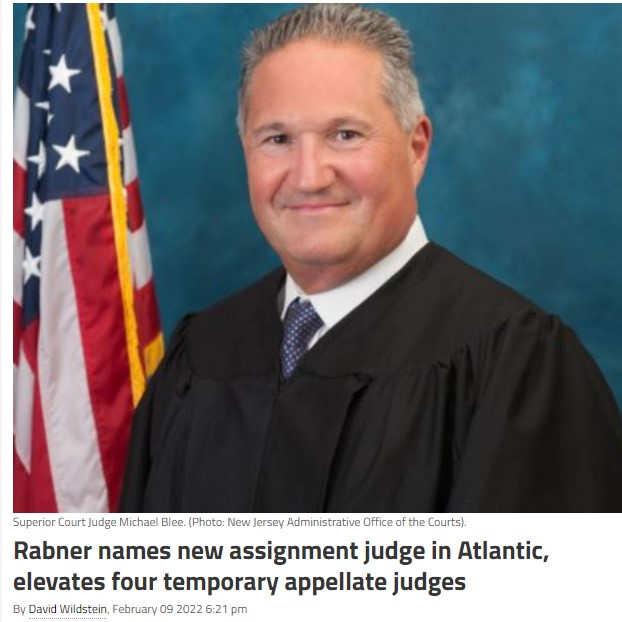Above Image: Judge Michael Blee was appointed Assignment Judge for Atlantic, Cape May and Cumberland Counties last February. On August 5, he will hear arguments on our claim that New Jersey State Constitution does not permit state to give Atlantic City casinos special treatment on their real estate taxes. The case will be heard at 11 am at the Atlantic County Civil Court House in Atlantic City. The case will also be livestreamed and viewable via the following weblink: www.njcourts.gov/public/channe
Below is a copy of the latest brief we filed with the court earlier this week.
RE: LIBERTY & PROSPERITY 1776, Inc., et als. vs. State of New Jersey, et als.
Docket No. ATL-L-170-22
Cross Motions by Defendants to Dismiss and Motion by Plaintiff for Summary Judgment
Returnable August 5, 2022
PRELIMINARY STATEMENT
Paragraphs 6 through 21 of Plaintiffs Statement of Material Facts are not disputed. Those undisputed facts clearly show that for six years, from 2010 through 2016, the State defendants did nothing to “rescue” the City of Atlantic City (hereinafter referred to as “the City”) “from the brink of bankruptcy”. On the contrary, their “gross violations” of the Local Budget Law, after taking control of the City finances in October of 2010, buried the City in more than $400 million of debt.
If the Casino Property Tax Stabilization Act (CPTSA) were a “comprehensive legislative and financial rehabilitative taxation program” when first adopted in 2016, the amendments of 2021 are certainly not. The original CPTSA purported to be a ten year program. However, that completely changed after just five years. The amended CPTSA simply gives special tax treatment to the rich, influential industry that requested it. In short, the new amended CPTSA is similar to the special tax laws for railroad property that provoked the adoption of Article VIII, Section 2 (the “uniformity clause”) of our State Constitution in 1875.
There is nothing unique or special about hotels, restaurants, entertainment areas, retail shops, restaurants, parking garages, etc. owned by holders of casino licenses, and those owned by anyone else. There are no special or unique problems in assessing them at their true market values for tax purposes.
That was made abundantly clear in the New Jersey Tax Court decisions resolving tax appeals of casino owned properties. The first of those decisions was Marina District Development Co., LLC v. City of Atlantic City, Tax Court Docket Nos. 008116 & 008117 of 2009 and 003188 and 003194 of 2010 (hereinafter referred to as “the Borgata Tax Appeal”) decided on October 18, 2013.
The Tax Court, after a 21 day bench trial, found that the Borgata casino property was entitled to “a significant reduction” in its assessments for 2009 and 2010. It found that “beginning in 2007 and continuing to 2009”, there were “powerful forces. . . combining to undermine the Atlantic City casino-hotel market in ways that threatened lasting adverse economic consequences”.
The City, while under State “supervision” completely failed to adjust to those “powerful forces”. It did little or nothing to reduce spending or budget in any way for the possible reduction of its real estate assessments. It continued to assess virtually all real estate in Atlantic City, including casino properties, at pre-2007 levels. It appealed the 2013 Tax Court decision for the Borgata Tax Appeal to the Appellate Division of Superior Court..
The Appellate Division affirmed the Tax Court decision of the Borgata appeal on July 6, 2015 in Marina District Development Co., LLC vs. City of Atlantic City (App Div. A-1616-13T4, 2015). It adopted “Judge Patrick DeAlmeida’s comprehensive and thoughtful written opinion”. The Appellate Division also found that,
“the national economic difficulties affecting business values during the tax years under review (2009 and 2010) and the overall casino market in Atlantic City as affected by neighboring states interposing significant competition upon the state’s casino industry. . . were not considered by or accounted for in defendant’s (Atlantic City’s) tax assessment. . . “ Marina District, supra, at page 5.
The Appellate Division also held “the income approach (applied by the Tax Court) is neither novel in rendering assessments nor unique to Atlantic City casinos. . . “ Marina District, supra, at page 5.
State officials then had the City appeal that decision to the New Jersey Supreme Court. The Supreme Court denied certification on November 10, 2015.
PROCEDURAL HISTORY AND RELEVANT FACTS
Nothing in the briefing schedule of the April 28, 2022 precluded plaintiffs from moving for Summary Judgment before trial. Nothing in Rule 4:46-1 or any other rule precludes Plaintiffs from relying on their Brief and Statement of Material Facts with supporting certification for Summary Judgment as opposition to Defendants’ Motion to Dismiss.
ARGUMENT
There is no possible “presumption” or “alternative interpretation” of the CPTSA that can avoid its conflict with the plain, unambiguous language of Article 8, Section 1 of the New Jersey State Constitution. That provision is described as “the uniformity clause” in NJ State League of Municipalities vs. Kimmelman, 105 NJ 422 (1987).
The uniformity clause requires that
“All real property assessed and taxed locally. . . shall be assessed according to the same standard of value. . . and such real estate shall be taxed at the general rate of the taxing district in which the property is situated, for the use of such taxing district”.
The CPTSA clearly purports to exempt “real property located in Atlantic City, and any adjacent property utilized in connection with such property, upon which there is located a facility licensed to be used for casino gaming. . .” from being assessed and taxed that way.
Moreover, the CPTSA clearly benefits a big, rich, and influential industry. On May 23, 2022, the NJ Division of Gaming Enforcement reported that Atlantic City casino properties paid an 8% Gross Revenue Tax of $177,794,000 in 2021. That means those casino properties had Gross Revenue of $2,222,425,000 that year. The value of real estate owned by Atlantic City casino operators roughly equals the value of all other real estate in the town.
In the Kimmelman case, supra, our State Supreme Court gives a detailed history of how and why the uniformity clause was added to our State Constitution in 1875.
“The dominant industry of that time, the railroads, exerted considerable influence over the Legislature’s taxing power and had obtained for itself virtual exemption from taxation. . . Growing sentiment mobilized by Governor Parker led to a constitutional convention that produced the first limited restraint against preferential tax treatment for one industry. . .”
Kimmelman also cited with approval Roe v. Kervick, 42 NJ 191, at 207, 199 A2d 834 (1964) quoting from an 1870 Michigan Supreme Court case:
“When the State once enters upon the business of subsidies, we shall not fail to discover that the strong and powerful interests are those most likely to control legislation, and that the weaker will be taxed to enhance the profits of the stronger. . . “
Besides violating the uniformity clause, the CPTSA is almost identical to the special tax laws adopted to benefit the railroad industry in the 1870’s that provoked the adoption of the uniformity clause in the first place! If the State’s arguments prevail in this case, it is difficult to imagine any real estate tax preference that would be barred by the uniformity clause. If the State’s arguments prevail, the State would even be permitted to completely ignore the original purpose of the uniformity clause and exempt railroad property from regular assessment and local real estate taxes!
The state argues that this special tax law for casinos has a “rational relation to the legitimate object sought to be obtained”. Those who wanted special tax laws for veterans, farmers, and senior citizens could have made that same argument. However, those preferences were only permitted when our 1948 the State Constitution was amended.
Defendant’s objection to Plaintiffs’ citation of Gallenthin Realty Development Inc. vs. Borough of Paulsboro, 191 N.J. 344 (207) is misplaced. Plaintiffs cited Gallenthin simply to point out that the original CPTSA of 2016 could not justify special tax treatment for luxury casino properties by claiming they were part of a “blighted” area “in need of redevelopment”.
Town of Morristown v. Woman’s Club of Morristown, 124 N.J. 605, 612 1991 held that a building certified by the Commissioner of the NJ Department of Environmental Protection as a “State Historic Site” and maintained by a charitable
organization to preserve it, served a specific “public purpose of preserving historic sites”.
Article 8, Section 2 of our State Constitution is the justification for that exemption. It states:
“Art. 8, Section 1, Paragraph 2: Exemption from taxation may be granted only by general laws. Until otherwise provided by law, all exemptions from taxation validly granted and now in existence shall be continued. Exemptions from taxation may be altered or repealed, except those exempting real and personal property used exclusively for religious, educational, charitable, or cemetery purposes as defined by law, and owned by any corporation or association organized and conducted exclusively for one or more of such purposes and not operated for profit”.
Luxury casinos owned and operated by for-profit entities clearly are not contemplated by this section of our State Constitution. If the court accepts the state’s argument that Atlantic City casinos serve a public purpose because they pay taxes and employ people, then every commercial property for businesses that employ people and pay taxes would also qualify for special tax treatment!
Finally the State repeatedly refers to “damaging local property appeals” as a reason to exempt casino properties from regular real estate assessments and taxes. There is nothing “damaging” about property owners requesting review of excessive assessments by the County Board of Taxation or State Tax Court. There was only “damage” from tax appeals when State officials supervising the City repeatedly approved budgets based on arbitrary and excessive tax assessments of casino and non-casino properties alike that ignored economic conditions after 2007. In 2015, the Supreme Court allowed the 2013 Borgata Tax Court decision to stand. At that time, the City and its States supervisors accepted reality, assessed casino and non-casino properties at their true values, and cut spending to sustainable levels. Local property tax appeals have not been a problem in Atlantic City since 2015.
Respectfully submitted, SETH GROSSMAN, Attorney for Plaintiffs
Dated: July 27, 2022


